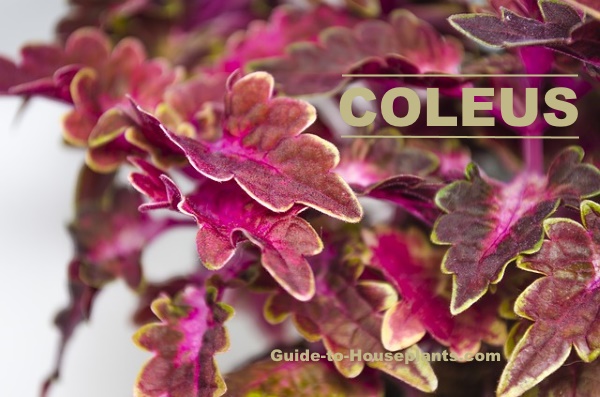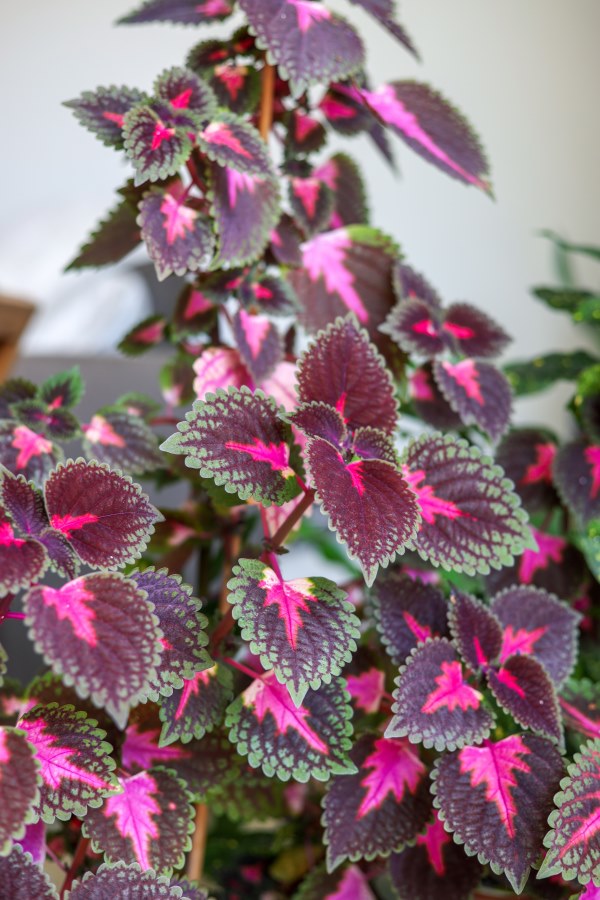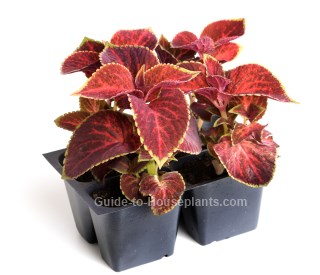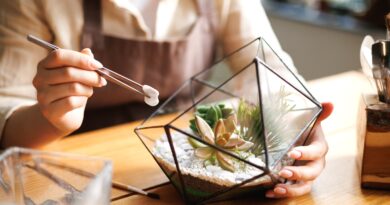Growing Coleus Plant Indoors: Get Houseplant Care
Botanical Name: Coleus blumei
Coleus plant, also known as Painted Nettle, is often grown outdoors as an annual because it is frost-tender. But it’s easy to grow indoors if you can provide bright light.
Distinctive leaf shapes, intricate patterns, and rich colors rival some of the showiest foliage plants.

Get to Know Coleus Plants
Best known as a garden annual, coleus has stunning foliage, making it a worthwhile — although temporary — houseplant.
Broadly ovate, lance-shaped, or deeply lobed leaves grow in opposite pairs carried on tall, fleshy stems. You may need to stake the plant to keep it upright.
You can expect tall flower spikes in summer with clusters of tiny, white or blue flowers. You can pinch off the flower spikes as soon as you notice them because they not only will detract from the beautiful foliage, coleus plants will decline after they have bloomed.
There’s no need to over-winter them. I replace my coleus plants when they get tall and leggy. This garden favorite is inexpensive. Besides, I like to try new varieties each year.
Coleus Varieties
Boundless varieties of coleus are available. Foliage colors include red, maroon, brown, cream, yellow, orange and green in dramatic combinations and designs. Leaf edges may be scalloped or ruffled and have a contrasting color.
Stunning new hybrids make choosing just one nearly impossible. Fortunately, we don’t have to choose. Coleus plant is easy to find in garden centers, and a cinch to grow from seed. It’s also practically foolproof to propagate from a plant — just cut off a stem and stick it in a glass of water.
 Give coleus bright light near a window to maintain vivid colors. Photo: Mor Shani
Give coleus bright light near a window to maintain vivid colors. Photo: Mor ShaniColeus Problems, Solutions and Answers
Pinch your plant. Coleus plants can get leggy. Pinch growing tips early and often to encourage them to branch out and stay bushy and full.
Keep it moist. Coleus leaves will wilt and may fall off if the soil is too dry. You’ll have a much healthier-looking plant if you keep the soil moist at all times. Use a pot with drainage holes and water thoroughly. Need a container? Check out the stylish self-watering pots available now. It’s just the thing to keep your coleus from wilting this summer.
Dropped leaves? Low light, dry soil or cold air can cause leaves to drop. Don’t worry — this vigorous plant will replace them when it gets what it wants.
Something bugging your plant? Aphids like to attack soft, new growth, which coleus has in abundance. Isolate an infested plant to avoid aphids moving on to your other houseplants. Treat it right away by spraying it with soapy water (mild dish soap works fine) or with insecticidal soap.
Coleus Plant Care Tips

Origin: Southeast Asia
Height: Up to 2 ft (60 cm)
Light: Bright indirect light. Some direct sun is okay, except intense summer sun which will scorch the leaves. Too little light dulls leaf colors and may cause leaves to drop. Don’t have a sunny spot? Coleus plants respond beautifully to artificial light. Set plants 6 to 12 inches (15 to 30 cm) below light fixtures for about 12 to 16 hours a day. Turn lights off at night to give them at least 8 hours of darkness. (Coleus plants need a good 8 hours of rest, too.)
Water: Keep soil evenly moist. Leaves will wilt if thirsty. Avoid getting the velvety leaves wet. Hard water will cause white spots and they won’t come off. Remember to always use room-temperature water when watering houseplants.
Humidity: Try to maintain at least 40% relative humidity near your plant. Check out these easy ways to increase humidity for your tropical house plants. Don’t mist coleus leaves because tap water will leave spots.
Temperature: Average room temperatures 65-75°F/18-24°C. Leaves may wilt or fall off if the plant is exposed to temperatures below 55°F/13°C. Keep coleus plant away from cold entryways and heat/AC vents.
Soil: Any good-quality, all-purpose potting mix
Fertilizer: Feed every 2 weeks spring and summer with a balanced liquid fertilizer diluted by half.
Propagation: Sow coleus seeds in spring. Cover seeds lightly with potting mix and maintain 75°F/24°C temperature. Take 3 in (7 cm) coleus stem tip cuttings in spring or summer. Stem tip cuttings root easily in water or moist soil.




